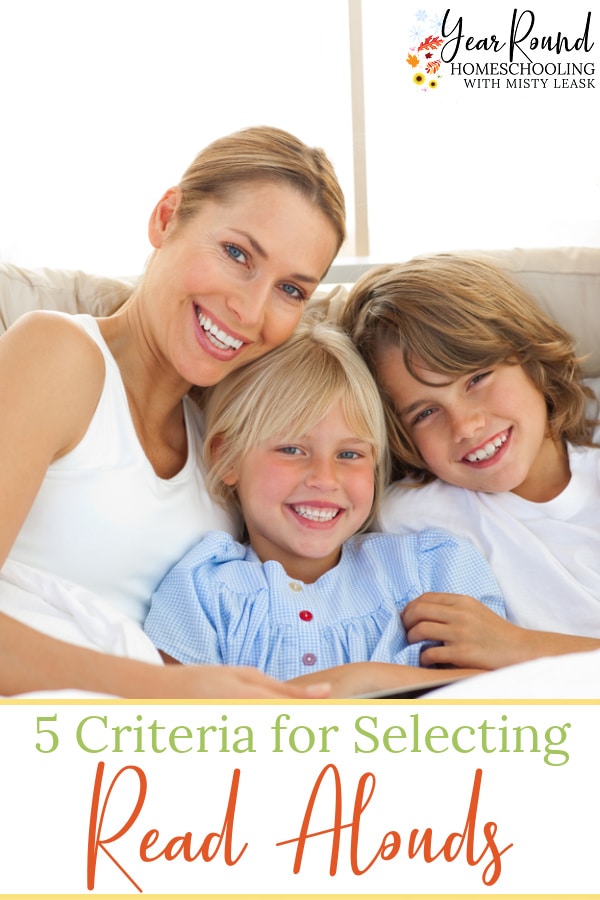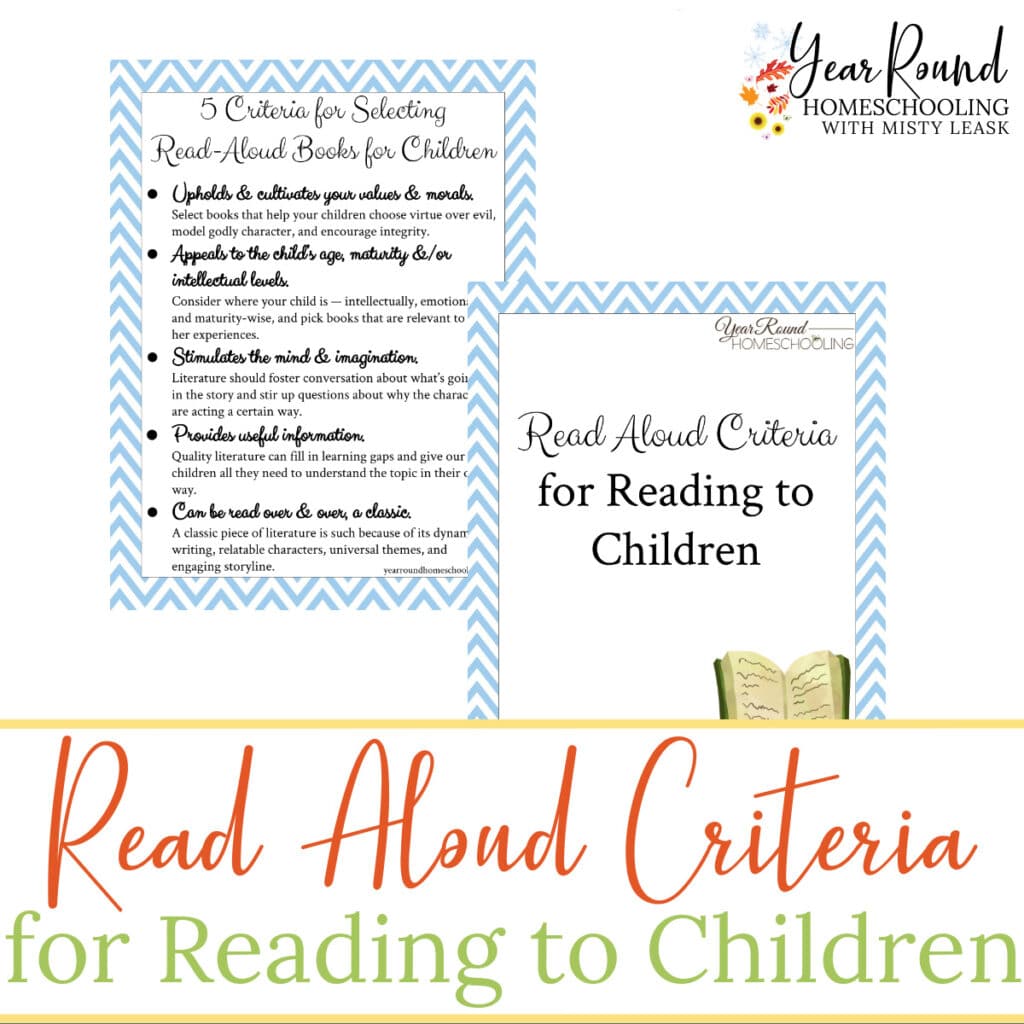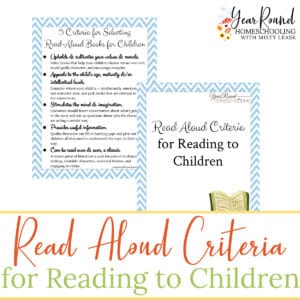I’ve shared with you previously why you should make read-aloud time a priority in your homeschool, my aim this time is to provide some criteria for choosing good read-aloud books. Why? There are lots of options out there but, in my opinion, not all books are created equal.

When I first started teaching my oldest to read, we would bring home dozens of library books. Try as I might, my daughter always found Dora or Scooby-Doo books. So as not to discourage her in her efforts to read, I allowed her to check out these books, but I also picked out my own books– those more in line with what I consider “quality literature.” Since then, my daughter has caught on and discovered for herself the authors and books that appeal to her — that stimulate her mind and feed her imagination.
“If we want the mind of a child to come alive, we feed him living ideas.”
Charlotte Mason, Home Education
Each year as I prepare for a new school year, I create a list of books for our daily read-aloud time. These titles comprise both picture books and chapter books, due to the young ages of my children, and come from a variety of sources, including the following:
- Ambleside Online’s book lists (by year)
- Sonlight’s book lists (by age)
- Simply Charlotte Mason book lists
- Recommendations from blogs, family and friends
- Our personal library collection
The books on these lists and those recommended must adhere to specific criteria in order for me to share them with my young, impressionable children. Below you will find the characteristics I’m looking for in a good read-aloud book, whether a picture book for a young child or a chapter book for a child of reading age.
5 Criteria for Selecting Read-Aloud Books for Children
- Upholds & cultivates your values & morals. There are too many “worthy” books out there to waste your time on those that don’t mesh with the goals and standards you have for your children. For our family, books that encourage arguing or selfishness, that demean parents, condone sinful behavior, or neglect to show just consequences for actions are not allowed in our home. Select books that help your children choose virtue over evil, model godly character, and encourage integrity.
- Appeals to the child’s age, maturity &/or intellectual levels. While Pride & Prejudice is one of my favorite novels, it is not appropriate for a 6-year-old. Consider where your child is — intellectually, emotionally, and maturity-wise, and pick books that are relevant to his or her experiences. Also consider the book’s length, number of illustrations, length of chapters, and vocabulary. You may not know if the book is age-appropriate until you start reading it, but don’t feel like you have to continue reading if no one’s interested or if it’s over their heads.
- Stimulates the mind & imagination. Good books encourage a child’s self-education. That is, they should foster conversation about what’s going on in the story and stir up questions about why the characters are acting a certain way. Good books make you think, wonder, and want to find out more. When your child wants to learn more about rabbits after reading Peter Rabbit or to dress up like Laura in Little House in the Big Woods and go hunting with Pa, then you know you’ve found something worth reading.
- Provides useful information. Instead of lecturing on a particular subject, Charlotte Mason suggested using living books instead as they provide all the information a child needs to come to his own understanding of the subject. Spoon-feeding our children exactly what we know limits their knowledge of a subject. Good books can fill in our gaps and give them all they need to understand the topic in their own way. Thus, a child takes ownership of his education and becomes his own teacher.
- Can be read over & over, a classic. Good books have stood the test of time and are still enjoyed today, even though many were written a long time ago. A classic piece of literature is such because of its dynamic writing, relatable characters, universal themes, and engaging storyline. Think Little Women or To Kill a Mockingbird. There’s a reason why these books are still popular today. Your parents read them, you’ve read them, and now you can pass them down to your children.
Create Your Own Criteria for Selecting Read-Aloud Books
As you select books to read aloud to your children, think about your own criteria. Consider these questions:
- Do you have certain qualifications you’re looking for, or do you simply pick books at random?
- Are there certain types of books you don’t want your child to read (i.e., fairy tales, scary stories, comic books)?
- Are there favorite authors you loved as a child that you want your child to read too?
- What about favorite books you want to share with your child?
- Are there certain topics you want to avoid?
- Are there books you think your child needs to read for spiritual, religious, or educational reasons?
Perhaps you have a mental list of criteria for selecting good books for your children. If not, I hope you’ll think about books and reading and make an effort to devise your own personal list of read-aloud book criteria. Doing so will help you stay focused on the goals you have for your children and help you eliminate those horrible books your child insists on checking out yet again.
Homework Assignment:
Take 10 minutes and jot down the answers to the above questions. Then, begin making a list of books you want your child to read this year. Share that list with your child and get his input. Plan a day to go to the library to check out 1-2 books on your list.
Do you have specific criteria for choosing read-aloud books for your children? If so, what are they?



